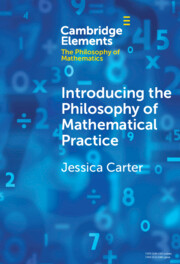Refine search
Actions for selected content:
2 results

Introducing the Philosophy of Mathematical Practice
-
- Published online:
- 27 November 2024
- Print publication:
- 02 January 2025
-
- Element
- Export citation
2 - Metaphysics of Mathematics
-
- Book:
- The Metaphysics and Mathematics of Arbitrary Objects
- Published online:
- 24 May 2019
- Print publication:
- 13 June 2019, pp 13-37
-
- Chapter
- Export citation
